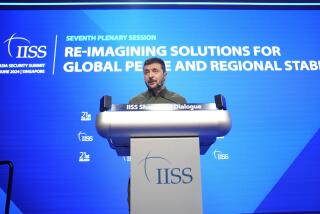Jaruzelski and Deng Open Peking Talks
- Share via
PEKING — For the first time in more than a quarter-century, the top leaders of China’s Communist Party met face-to-face Monday with a Communist Party chief from a hard-line Soviet Bloc nation.
Polish leader Wojciech Jaruzelski, who is in Peking for a three-day visit, conferred Monday morning with Chinese leader Deng Xiaoping and then with the party general secretary, Hu Yaobang.
In the meetings, Gen. Jaruzelski apparently sought to emphasize that China has common bonds with other Communist countries. According to the official New China News Agency, Jaruzelski “extended congratulations to Deng on China’s successes resulting from the open policy, saying that all Communist countries are closely following China’s development.”
Restoring Links
Jaruzelski is first secretary of the Polish Communist Party, and his session with Hu represented, in effect, a restoration of the links between the Polish and Chinese parties that were suspended during the bitter ideological feud between China and the Soviet Union in the early 1960s.
“When Jaruzelski is received by Hu Yaobang, it’s a de facto normalization of relations between their parties,” a West European diplomat said.
Not since Soviet leader Nikita S. Khrushchev visited Peking in 1959 has any leader of the Chinese party met with his counterpart from the Soviet Union or any of its closest allies in East Europe--Poland, East Germany, Hungary, Czechoslovakia and Bulgaria.
The only East European party leaders to visit China since then have been those from Yugoslavia, which is not a Soviet Bloc nation, and Romania, which has a foreign policy that is relatively independent of Moscow.
First in Series
Jaruzelski’s stop here is expected to be the first in a series of visits to China by leaders of Soviet Bloc countries. East German leader Erich Honecker is scheduled to arrive next month, and Hungarian leader Janos Kadar or another senior Hungarian party leader is likely to come here within the next year.
All these visits have reportedly been cleared with Soviet leader Mikhail S. Gorbachev. According to an East European source, Gorbachev cleared the way for East European parties to restore relations with the Chinese during a series of party meetings in East Germany, Poland and Hungary earlier this year.
Gorbachev has repeatedly emphasized his desire to improve relations between Moscow and Peking. He and other Soviet officials apparently hope that permitting links between China and Eastern Europe will be a step toward that goal.
Separate Issue
Chinese officials, however, have suggested that they will proceed with the East European countries separately from the Soviet Union. Any significant upgrading in Sino-Soviet relations, they have said, must wait until after Moscow stops supporting Vietnam’s occupation of Cambodia.
In recent weeks, Chinese officials have sought to minimize the importance of the improved ties with the Soviet Bloc, arguing that the Chinese Communist Party has relations with a variety of Communist and Socialist parties throughout the world.
“You Americans don’t have to worry,” an official of the Chinese party’s international liaison department told a Times reporter at a Peking reception last month. “There is no monolithic Communist bloc now. We are not going back to the 1950s.”
U.S.-Soviet Contest
Some diplomats here view the new ties with Eastern Europe as another reflection of Peking’s desire to carry out a foreign policy that has the effect of inducing the United States and its allies to compete with the Soviet Union and its allies for better relations with China.
As a reflection of this delicately balanced policy, in the two weeks after Jaruzelski leaves Chinese leaders will entertain U.S. Secretary of Defense Caspar W. Weinberger and Britain’s Queen Elizabeth II. Honecker will then follow.
Although Jaruzelski was permitted to meet with China’s top leaders, and a Polish official later said the atmosphere was friendly, his trip has not been entirely smooth.
Originally, Honecker’s visit here next month was to have been the ice-breaker between China and Eastern Europe. But the Polish leader had already planned visits to Mongolia and North Korea in September, and a few weeks ago he asked for permission to stop in China during this trip to East Asia.
‘Soviet Puppet’
The Chinese were taken aback, but reportedly realized that if they said no to Jaruzelski it was possible that the Soviet Union might then have persuaded Honecker to call off his trip to Peking.
“Jaruzelski is more clearly a Soviet puppet,” a Peking-based diplomat said. “The Soviets wanted both the Eastern European countries and China to realize that nothing could be done without a Soviet green light.”
China countered by labeling Jaruzelski’s hastily scheduled trip a “working visit” and had no formal welcoming ceremony for him.
Some Disagreements
Official Chinese press accounts made it clear that there were some disagreements in the talks Monday.
“Our two countries share similar views on many issues while still entertaining some differences,” Hu was quoted as saying. “But their similar views will help overcome their differences.”
One difference almost certainly involved Vietnam, with which China is still engaged in sporadic border skirmishes. A joint statement issued after Jaruzelski’s visit to Mongolia last week said Jaruzelski supports Vietnam’s peace initiatives for Cambodia--initiatives that China strongly opposes.
More to Read
Sign up for Essential California
The most important California stories and recommendations in your inbox every morning.
You may occasionally receive promotional content from the Los Angeles Times.










